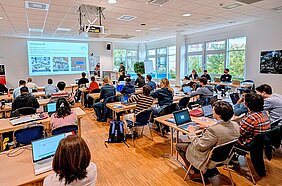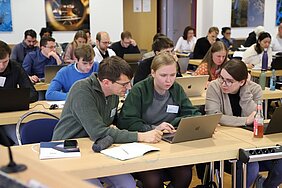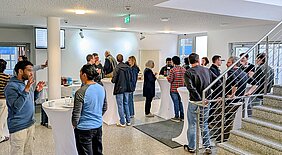How can current AI methods be used in a targeted manner in research to solve complex research questions more efficiently? This question was the focus of the second joint AI School of the Leibniz Research Network “Mathematical Modeling and Simulation” (MMS), the University of Leipzig with the Center for Scalable Data Analytics and Artificial Intelligence (ScaDS.AI), and the Leibniz Institute of Surface Engineering (IOM).
From October 6 to 9, 2025, AI enthusiasts from more than 20 institutions of the Leibniz Association gathered at the IOM to acquire practical knowledge of artificial intelligence methods and tools in an intensive training program. As a central format of the Leibniz Association, the Leibniz AI School thus contributes to strengthening AI competence in its research institutions – and prepares researchers for the future.
Under the motto “Interdisciplinary learning based on practical cases,” four intensive training days demonstrated how AI, mathematics, and simulation intertwine. Participants deepened their knowledge of high-performance computing, machine learning, deep learning, data wrangling, and visualization techniques. In practical exercises, they worked directly with Python, scikit-learn, and PyTorch – always with the goal of translating theoretical methods into concrete research applications.
Special attention was paid to the use of large language models (LLMs) in scientific work. ScaDS.AI demonstrated how generative models can support researchers in JupyterLab with programming and data analysis using its specially developed AI assistant bia-bob. In specialized sessions, the IOM also presented the application of Bayesian optimization for efficient material development, the Leibniz Institute of Photonic Technology (IPHT) presented AI-supported approaches in spectroscopy, and the University of Paderborn presented machine learning methods for atomistic simulations.
This once again made Leipzig a hub for interdisciplinary AI learning within the Leibniz Association – a place where mathematics, computer science, and scientific research come together to break new ground in data analysis and modeling.
Open learning opportunities online
The Leibniz AI School was aimed at participants with basic Python skills. All teaching materials are available here, open and free of charge: https://scads.github.io/ai-school-iom-2025/intro.html




